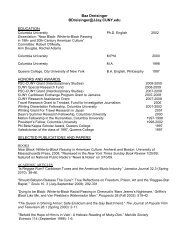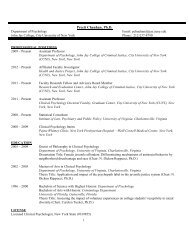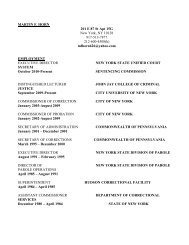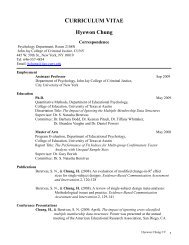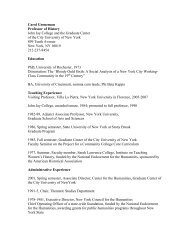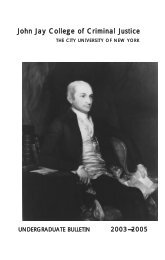Bulletin - John Jay College Of Criminal Justice - CUNY
Bulletin - John Jay College Of Criminal Justice - CUNY
Bulletin - John Jay College Of Criminal Justice - CUNY
Create successful ePaper yourself
Turn your PDF publications into a flip-book with our unique Google optimized e-Paper software.
Courses <strong>Of</strong>fered<br />
HIS 381 Social History of Catholicism in the Modern<br />
World<br />
3 hours, 3 credits<br />
This course offers students an introduction to how Catholicism has<br />
shaped social identities and cultural practices across global cultures<br />
from the early 1500s to the present day. Starting with the Catholic<br />
response to the Reformation in 16 th -century Europe, the course then<br />
traces the complex social and cultural formations generated by an<br />
expansive Catholicism in Asia, Latin America, and Africa, and the<br />
tension between Catholicism and American culture in the history of<br />
the United States. Key topics will include the history of Catholicism<br />
and culture, syncretism, ethnicity, race, gender, and social class.<br />
Prerequisites: ENG 102 or ENG 201, HIS 204 or HIS 232, and HIS<br />
203 or HIS 205 or HIS 232<br />
writing skills they have acquired in the major. Drawing on students’<br />
capabilities to engage in independent historical research, and<br />
consideration of a wide variety of historiographic approaches, the<br />
course offers students from all three chronological tracks the<br />
opportunity to engage in research on the same topic and present their<br />
work at the departmental seminar. Individual instructors will frame<br />
the course based on their particular areas of expertise, but possible<br />
topics include slavery, magic, capitalism, and sexuality. All students<br />
will complete the course by submitting an independent research paper<br />
and presenting their findings to the department in a colloquium.<br />
Prerequisites: ENG 102 or 201, HIS 300, senior standing<br />
HONORS<br />
HIS 383 History of Terrorism<br />
3 hours, 3 credits<br />
This course explores the major ideas, facts, and problems associated<br />
with the historical study of terror and the uses of political violence on<br />
a global scale. Course themes include the changing definitions of<br />
terrorism over time; the historical antecedents of modern terrorism;<br />
the impact of nationalism and religion on terrorism in different places<br />
and beginning in the early modern period; the historical motivations,<br />
organizations, and support networks of terrorists; the nature of crisis<br />
management; the responses of the world community to different<br />
historical acts of terrorism; the effects of terrorism on free societies in<br />
the 20 th century; and the linkages between acts of terrorism and<br />
terrorist states.<br />
Prerequisites: ENG 102 or 201, and HIS 205 or HIS 232, and either<br />
HIS 203 or 204 or HIS 231<br />
HIS 425 Senior Seminar in History<br />
3 hours, 3 credits<br />
The senior seminar, undertaken by all Global History majors,<br />
requires students to synthesize the research, historiographic, and<br />
HON 501 Honors Reading Course<br />
3 hours, 3 credits<br />
The student submits a project of reading and research for the term,<br />
for approval by the instructor. A paper is required and there are<br />
periodic conferences. Special arrangements may be made to do this<br />
work over the summer.<br />
Prerequisites: ENG 102 or ENG 201, and senior standing<br />
HUMANITIES AND JUSTICE (see<br />
Major description for contact)<br />
HJS 250 <strong>Justice</strong> in the Western Traditions<br />
3 hours, 3 credits<br />
This course is the first of four required courses in the core of the<br />
Humanities and <strong>Justice</strong> major. It is an introduction to the normative<br />
history of "justice" as a principle of human personal and social<br />
organization in the experience of peoples living in the "western"<br />
world. An emphasis on primary texts allows the student to encounter<br />
first principles, and selected secondary readings introduce the student<br />
95



